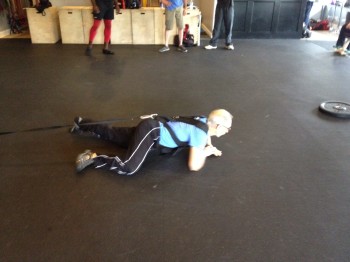The Funny Thing About Crawling
Apr 08, 2015

It is weird to think that crawling around can make you stronger. It is not too weird to understand how it can make a baby stronger, after all, they are tiny. But it is almost a stretch of the imagination to think that crawling could really add appreciable strength to an adult. But yet it can.
I wont go into all the wonderful, awesome details of how crawling connects the whole body together: the brain, the senses, the systems, the muscles, etc... We talk about that a great deal in all our books, videos and workshops. Just know that when your body is completely integrated and whole, you can move very well and express great strength. It's a beautiful thing.
Today, I want to look at crawling through a simple strength training lens. Crawling, especially on your hands and feet (leopard or spider-man crawl), requires you to learn how to maneuver and manipulate your body while holding your self up, suspended. Being able to control your own mass, resisting gravity and moving across the ground is a great way to build real, usable strength.
It takes effort and energy to keep yourself suspended while you crawl for distance or time. At first, it takes a great deal of effort. Anyone who has tried leopard crawling for any length of time past a minute can probably testify to that. It assaults the whole body - the heart rate jumps ups, breathing is increased, and muscles begin to burn, shake, and quiver. But thats in the beginning. Over time and effort, crawling gets easier. What is happening? The body is getting stronger. Yes, the body is also getting more efficient at crawling, but an efficient nervous system yields a strong body. Whether one gets stronger from progressive, increased loads, or one gets stronger from efficient neural pathways, expressed strength is strength.
But again, owning and controlling how your body moves under tension (the tension imposed by your own bodyweight and gravity) is the best place for strength to start. Eventually, the body does get stronger. What once took a great deal of effort becomes easy. You might go from crawling with a great deal of tension throughout your body to crawling completely relaxed, being very fluid and poetic when you crawl. How does this happen? Strength increases. Control increases. When you master the control of your movements, you harness great potential in strength, speed, power and endurance.
Crawling for time and distance is a wonderful way to learn and build your control and your strength. Yes. Crawling, especially bodyweight crawling, is not the traditional method of strength training through progressive loading (like weight training). But traditions often leave people stuck and frustrated. Besides, what is the point of trying to manipulate external loads when one can't even move their own mass well, with relative ease? If you do love lifting and moving external loads, in a traditional sense, learning how to crawl well sure does make weight training a whole lot easier. When you own your ability to move your body very well, you can really demonstrate your will and strength when it comes to moving external loads. When you move well with strength, life is just easier - in the weight room and out in the real world.
Oh yeah, crawling also sharpens and develops coordination between your members. Coordination is another overlooked quality when it comes to strength. Coordination allows for the fluid and perfect timing of strength expression.
Crawling - moving under the load of your own body - is sensible strength training at its best. It's inherently safe, it something most all of us have done at one time or another, it allows for easy progression (time, distance, speed, extra weight, direction, knees or feet, forearms or hands), and it builds a body capable of expressing tremendous strength - controlled strength. Best of all, it is just simple. It's not easy, but it is also not complicated. It is A simple way to build the kind of strength most people fantasize about. It is kind of funny when you think about it. It is also refreshing.
Comments (0)
Please login to comment.